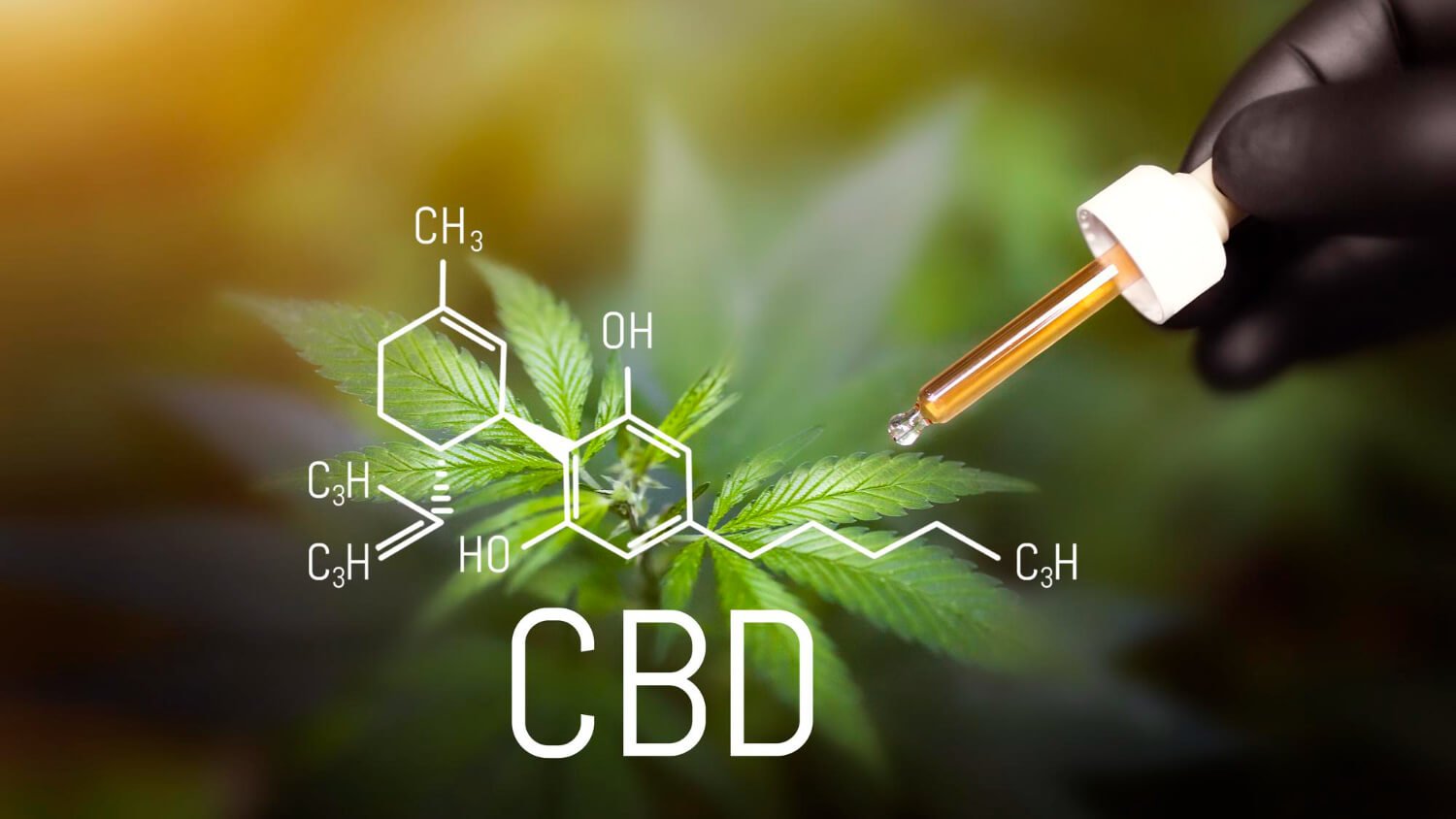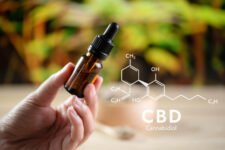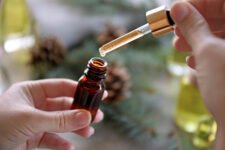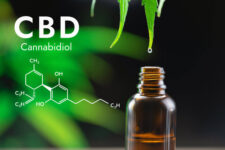If you’re someone who’s new to this whole ordeal about CBD, then your concerns and queries about ‘what is CBD?’ are pretty much justified. However, there’s no longer any need to worry about it – here is a comprehensive guide that will help you educate yourself on this topic easily.
A Definition of CBD (Cannabidiol)
If we start with the very basic-level knowledge first, then it is best to first answer your question – What is CBD? Why is it so special for everyone out there?
Well, CBD stands for Cannabidiol. It is a substance or a chemical that is obtained from hemp plants all over the world. It is a very useful and beneficial substance for human beings and even animals in some cases. [1]
Previously, it was thought and even ‘firmly believed’ in some countries of the world that CBD is an intoxicating chemical and that whoever uses it, becomes somewhat of a habitual user or ‘addict’. These beliefs led to the public shunning of CBD, and everyone began to avoid it like it was something very harmful to even talk about.
Nonetheless, it wasn’t until the latter half of the 20th century that scientists unveiled the potential health advantages of CBD. [2]
This newfound understanding gradually unveiled CBD’s concealed potential, transforming it into a highly coveted compound. Today, CBD stands as one of the most sought-after substances, addressing a diverse array of human health concerns including anxiety, depression, pain management, and sleep disorders. [3]
Where Is CBD From And How Is It Extracted?
Historically speaking, Cannabinoid or CBD was cultivated from the marijuana plant sometime in 1940. However, it took about two decades for the first of the researchers and experts to work out its structure and bring it forth to the world in around 1963. [4]
At this time, nobody was aware of what this ‘thing’ extracted from a plant was, and what it could be used for. It was only a year after that, in 1964, when Mechoulam and Gaoni discovered THC or tetrahydrocannabinol. [5]
This THC is the main psychoactive chemical substance that is notorious for imparting intoxicating or euphoric feelings, it is another cannabinoid different from the CBD. The sensation of being ‘high’ from consuming it is also due to the presence of THC. [6]
CBD is cultivated in various parts of the world, with varying degrees of growth across regions. Some areas prioritize its cultivation more than others, while in some places, it’s not grown at all.
The reason for the former varies between both the environmental conditions and the status of CBD. Many places still do not believe in the beneficial potential of CBD and thus, prefer not to have something ‘intoxicating’ and illegal growing on their lands.
Out of the many countries in the world, CBD is most popularly grown in the USA, Canada, China, and France.
The Science And Research Behind CBD
Ever since people got to know about the beneficial impacts of CBD on human health, research does not seem to have stopped in this area. Even now, several researchers are going on and about to discover what more is left to discover about this beneficial supplement. [7]
So far, whatever research has been done on CBD and the likes of it, it is clear that CBD is indeed among the best, beneficial, and effective products that have been known to mankind.
As has already been highlighted before, CBD could help treat several medical and health-related conditions. However, it is best not to consider CBD an alternative to medicines or drugs. It is because of this property that people are very likely to come off as someone who uses CBD just to get ’high’. [8]
It has been pointed out at various locations that CBD helps ‘accelerate’ or increase the road to recovery in these patients.
The common ailments and conditions that have been seen to respond well to CBD include localized and generalized pain, seizures, elevated blood pressure (unless it is extremely elevated; in that case, it is a medical emergency), control of diabetes, arthritis, and other inflammatory conditions.
All these benefits make experts wonder if CBD could be introduced as an alternative to medicine conditionally, especially for those patients who are unable to tolerate medicines or experience more side effects or reactions than others. [9]
Similarly, research has also been taking place along the lines of helping addicts and substance abusers treat their addictions through the use of CBD. CBD’s function in influencing the brain and regulating specific neurotransmitters aids in mitigating withdrawal symptoms from substances like opioids.
Furthermore, CBD’s effectiveness in addressing anxiety, depression, insomnia, and PTSD has been previously explored, representing some of its earliest identified applications. [10]
Different Forms And Uses of CBD
As the world got to know CBD and its benefits better, it was not long before everyone wanted to try using it at least once too. Some people were genuinely curious about the potential that CBD was hiding, whereas others were seriously wanting to try it for one or more of their health issues.
Therefore, to ease things up for everyone and also help people make the most of their CBD experience, there were several products introduced that were meant to be used specifically for specific purposes.
The reason behind this was the ‘dosage’ of CBD. It is a well-established fact that different effects of CBD require different dosages to act. Some need a higher dosage of CBD, others require just a tiny bit of amount. In either case, using too much or too less of CBD could disrupt its whole working mechanism and not have any effect at all. [11]
Therefore, selecting the right product for your needs is always the recommended option. Here is a list of all the popularly available CBD-related products along with their uses:
- CBD Creams & Lotions:
The most popular option for relieving pain and soothing worn-put muscles is by applying CBD-infused creams and lotions. These creams and lotions exert their effects within a short time of application, and before you know it, you will experience a pain-free interval from your chronic pain.
However, it is best to not use these creams and lotions as an alternative to analgesic medications. They are only better for short-term relief of pain.
- CBD Capsules, Pills, & Gummies:
All these options are used for a variety of purposes, with medicinal uses being the major ones to be resolved through them. Mood-related disorders, generalized pain, seizures, etc. could easily be controlled through pills and gummies taken in a prescribed manner.
Other forms of CBD include:
- CBD Oil
- CBD Cookies or Chocolates
- Patches, etc.
The Main Benefits Of CBD
CBD, or cannabidiol, significantly influences the entire body and overall well-being. Its ability to engage with the body’s endocannabinoid system allows for targeted interactions at specific sites, resulting in appropriate actions. However, some of the primary benefits of CBD include the following.
Pain Relief
CBD may help alleviate pain by interacting with receptors in the endocannabinoid system, potentially reducing inflammation and enhancing pain management.
Anxiety and Stress Reduction
CBD has shown promise in reducing anxiety and stress by affecting serotonin receptors, which play a role in mood regulation.
Sleep Improvement
CBD might aid in improving sleep patterns by promoting relaxation and addressing factors like insomnia or disrupted sleep.
Neuroprotective Effects
Some studies suggest that CBD could have neuroprotective properties, benefiting conditions like epilepsy and multiple sclerosis.
Anti-Inflammatory Effects: CBD’s anti-inflammatory properties may be beneficial for various inflammatory conditions, such as arthritis and other inflammatory skin conditions.
Anti-Seizure Activity
Epidiolex, a CBD-based medication, is approved for treating certain types of epilepsy in children, showcasing CBD’s potential in seizure management.
Substance Abuse Management
CBD might assist in reducing addictive behaviors and withdrawal symptoms associated with substance abuse.
Skin Health
Topical CBD products may help soothe skin conditions like acne, eczema, and psoriasis due to their anti-inflammatory characteristics.
Antioxidant Properties
CBD’s antioxidant effects may contribute to overall wellness and potentially counteract oxidative stress.
The Legal Status Of CBD
The legal status of CBD (cannabidiol) varies greatly based on factors such as its origin, THC concentration, and local rules. In the United States, CBD sourced from hemp with less than 0.3% THC became federally legal after the 2018 Farm Bill. However, individual states retain the power to impose their regulations. [12]
CBD from marijuana, containing higher THC levels, faces stricter rules and is generally lawful only in states permitting medical or recreational cannabis.
Globally, CBD’s legality fluctuates. Countries like Canada legalize both hemp and marijuana CBD for medical and recreational use. In contrast, other nations strictly regulate or ban CBD.
Understanding specific CBD regulations in your area is vital, and CBD product travel can be intricate due to varying rules. Prioritize trustworthy sources with third-party testing, as CBD legality evolves. Always consult local authorities for accurate and current information. [13]
It is important to research and understand the specific CBD regulations in your country, state, or region. Traveling with CBD products can also be complex, as regulations differ from place to place.
Similarly, when purchasing CBD products, ensure they come from reputable sources that provide third-party lab testing to confirm the CBD content and THC levels.
Conclusion: Why Should You Consider CBD?
To summarize, you should consider CBD for potential natural relief from pain, anxiety, sleep issues, and more. Its interaction with the endocannabinoid system offers a holistic approach to wellness.
The anti-inflammatory, neuroprotective, and calming effects of CBD hold promise for various conditions. Always choose quality products, adhering to legal regulations in your area.
Moreover, it is best to prioritize consultation with a healthcare professional, especially if you are on medications. While CBD is not a guaranteed solution, its potential benefits make it an option worth exploring for those seeking alternative methods to support their health and well-being. So, consider this your green signal to go and make the most of your CBD experience!
FAQs
What Is CBD?
Cannabinoid or CBD is a substance that is yielded from the hemp plant. CBD is a valuable substance with versatile applications in modern times. It is notably effective in addressing mood-related issues like anxiety, depression, PTSD, and insomnia. Moreover, CBD serves various medical needs such as pain relief, seizure management, diabetes control, and even blood pressure regulation. As we continue to uncover CBD’s benefits, its potential for diverse everyday uses is expected to expand further. There are several works of research going on to discover more about CBD and let the world know what this wholesome substance is capable of affecting the human health and mind.
How Does CBD Work In The Human Body?
CBD works with the body’s endocannabinoid system (ECS), which controls things like pain, mood, appetite, and immunity.
Even though CBD doesn’t directly connect to certain receptors, like CB1 and CB2, it does affect them.
This changes how the brain sends messages, helping with pain, anxiety, and swelling. CBD also affects mood by interacting with serotonin receptors. Thus, it has multiple mechanisms of action through which it exerts its impact.
It has an effect on other receptors too. All of these interactions might explain why CBD can help with pain and anxiety. But, scientists still need to learn more about how exactly it all works.
What Is CBD Usually Used For?
CBD finds application in various medical and health contexts. Its efficacy in treating anxiety, depression, and post-traumatic stress disorder (PTSD) sparked great interest. This was perhaps the first known benefit of CBD to the world.
Additionally, the introduction of CBD-infused oils, creams, and lotions prompted their use for pain relief and combating inflammation. Furthermore, CBD oil drops are employed by many to promote sleep and treat nightmares caused due to PTSD.
CBD is also used for controlling elevated blood pressure levels, controlling hyperglycemia in Diabetes Mellitus Type II, and also for treating arthritis and other inflammatory conditions of the body.
Is CBD Safe And Effective?
CBD is safe within recommended limits, but moderation is key. Ensure CBD intake aligns with safe amounts based on your body weight and requirements.
Excessive consumption can disturb metabolism and trigger health issues, including nausea, diarrhea, low blood pressure, and fatigue. Optimal results stem from using CBD moderately, ensuring safety and efficacy.
Therefore, it is best to use CBD in moderation. The recommended way is to start with lower doses so that you may see what dose suits your body’s needs. In this way, it is completely safe and fully effective in whatever it does, and you can safely enjoy your much-needed benefit too.
Is CBD A Drug?
Although CBD originates from Cannabis, which is considered to be an intoxicating substance, CBD itself is not a drug. However, CBD does have a wide range of therapeutic effects to offer to people that make it often mistaken as a drug or medicine, when in reality it is not.
Epidiolax is one exception, it is a CBD-based medicine made for treating some forms of epilepsy. It is expected that in the days to come, people will see more CBD-based medications for a wide range of health-related conditions.
Although many CBD products are seen as dietary supplements or wellness aids, legal categorization varies by location and source (hemp or marijuana).
Related:
References:
- Meissner, H., & Cascella, M. (2020). Cannabidiol (CBD). https://www.ncbi.nlm.nih.gov/books/NBK556048/
- Crocq, M. A. (2022). History of cannabis and the endocannabinoid system. Dialogues in clinical neuroscience. https://www.ncbi.nlm.nih.gov/pmc/articles/PMC7605027/
- Bridgeman, M. B., & Abazia, D. T. (2017). Medicinal cannabis: history, pharmacology, and implications for the acute care setting. Pharmacy and therapeutics, 42(3), 180. https://www.ncbi.nlm.nih.gov/pmc/articles/PMC5312634/
- Maioli, C., Mattoteia, D., Amin, H. I. M., Minassi, A., & Caprioglio, D. (2022). Cannabinol: History, Syntheses, and Biological Profile of the Greatest “Minor” Cannabinoid. Plants, 11(21), 2896. https://www.ncbi.nlm.nih.gov/pmc/articles/PMC9658060/
- Hasan, K. M. (2023). Cannabis Unveiled: An Exploration of Marijuana’s History, Active Compounds, Effects, Benefits, and Risks on Human Health. Substance Abuse: Research and Treatment, 17, 11782218231182553. https://www.ncbi.nlm.nih.gov/pmc/articles/PMC10286197/
- Ng, T., & Gupta, V. (2020). Tetrahydrocannabinol (THC). https://pubmed.ncbi.nlm.nih.gov/33085321/
- Liu, L., Liu, J., Zhao, M., Cai, M., Lei, F., Zeng, X., & Zhu, B. (2022). A bibliometrics and visualization analysis of cannabidiol research from 2004 to 2021. Frontiers in Pharmacology, 13, 969883. https://www.ncbi.nlm.nih.gov/pmc/articles/PMC9673983/
- Hilderbrand, R. L. (2018). Hemp & cannabidiol: what is a medicine?. Missouri medicine, 115(4), 306. https://www.ncbi.nlm.nih.gov/pmc/articles/PMC6140266/
- Atalay, S., Jarocka-Karpowicz, I., & Skrzydlewska, E. (2019). Antioxidative and anti-inflammatory properties of cannabidiol. Antioxidants, 9(1), 21. https://www.ncbi.nlm.nih.gov/pmc/articles/PMC7023045/
- Shannon, S., Lewis, N., Lee, H., & Hughes, S. (2019). Cannabidiol in anxiety and sleep: a large case series. The Permanente Journal, 23. https://www.ncbi.nlm.nih.gov/pmc/articles/PMC6326553/
- Larsen, C., & Shahinas, J. (2020). Dosage, efficacy and safety of cannabidiol administration in adults: a systematic review of human trials. Journal of clinical medicine research, 12(3), 129. https://www.ncbi.nlm.nih.gov/pmc/articles/PMC7092763/
- Corroon, J., & Kight, R. (2018). Regulatory status of cannabidiol in the United States: a perspective. Cannabis and cannabinoid research, 3(1), 190-194. https://www.ncbi.nlm.nih.gov/pmc/articles/PMC6154432/
- Dill, J. L., & Kurkowski, A. (2020). CBD: considerations for use within the health system. Hospital Pharmacy, 55(1), 9-11. https://www.ncbi.nlm.nih.gov/pmc/articles/PMC6961151/









